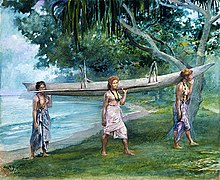
Vaʻa is a word in Samoan, Hawaiian and Tahitian which means 'boat', 'canoe' or 'ship'.[1] It is cognate with other Polynesian words such as vaka or the Māori word waka.[2]
The vaʻa usually takes the form a dugout canoe carved from a single tree trunk, typically used by one to three individuals for fishing activities around the island. It normally has a float or outrigger (called ama in various Polynesian languages), which is attached to the main hull for stability.
The word vaʻa contrasts with larger traditional seagoing vessels for long-distance voyages, whose names include vaʻa tele ('big ship'), alia, or tepukei.
A modern version of the smaller vaʻa is used in the sport of outrigger canoe racing. Due to the extra stability created by the outrigger system, a modified version of the va'a canoe was included as a new Paralympic Games event from 2020.
- ^ Pratt, George. "Title: A Grammar and Dictionary of the Samoan Language, with English and Samoan vocabulary, NZ Licence CC-BY-SA 3.0". NZ Electronic Text Centre, Victoria University of Wellington. Retrieved 19 November 2010.
- ^ Barclay-Kerr, Hoturoa (22 September 2012). "Story: Waka – canoes – 'Waka taua' Te Ara". Te Ara: The Encyclopedia of New Zealand. p. 3. Retrieved 12 January 2015.